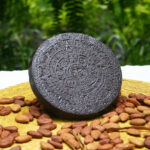Mexican food is known worldwide specially for some iconic flavors, such as cacao, tequila or maize. Still, not everybody knows that many popular ingredients used in different countries come from Mexico. An autochthonous product is an animal or a plant whose origin is a specific country or geographic region. In Mexico, we’ve got a long list of autochthonous products you might not have heard of.
Alongside maize, cacao, and tomatoes, there are ingredients like avocado, beans, nopal, chayote, epazote, soursop, and guavas that were first cultivated in Mexican land. Chia seeds and amaranth, two powerful superfoods, are also Mexican, as well as the least known quintoniles, prickly pears, xoconostles, and purslanes. Obviously, chili, corn smut, vanilla or agaves can’t be left out from the list. Nowadays, these products are necessary for some iconic dishes of different countries, and are produced in many places, not just in Mexico. However, there’s another list of products, these being 100% Mexican and that are not produced elsewhere.
When a specific region gives origin to a product with special characteristics and quality, the product is granted a special hallmark. This recognition is known as a Protected Designation of Origin (PDO) and ensures the authenticity of the product, protecting it inside and outside its country. Products with this hallmark have a name for themselves inside the market. Plus, the human and natural factors of the region they’re produced in are key to their special characteristics, which is why they wouldn’t be the same if manufactured or cultivated somewhere else.
Mexico has 18 Protected Designation of Origin products, mostly edible ones that share the best of our country through special flavors, aromas, processes, and textures. Hereunder, we share some facts about each of them:
- Cacao from Grijalva, produced in Tabasco with traditional Mayan techniques that involve a really unique way of fermentation and cacao toasting.
- Vanilla from Papantla, what makes it unique goes beyond its amazing flavor, because the drying of orchids and the vanilla pod extraction process are extraordinary.
- Rice from Morelos, only the families in Morelos that preserve the farming tradition hold a hallmark for their fine grained quality rice crops.
- Coffee from Veracruz, its spicy aroma, cinnamon flavor, and extraordinary way of cultivation at 750 metres high make it different from other Mexican coffee.
- Coffee from Chiapas, unique due to the acidity obtained from volcanic soil and to the amazing chocolate aroma. The caramel, maple, and vanilla notes can be appreciated in every sip.
- Pluma coffee, mostly produced in Oaxaca with a six month cultivating process that grants the drink a very special acidity.
- Habanero chili from Yucatán, originated in the Amazonas but planted in Mexico in a really different way. Habanero chili uses the planting of seedlings, which grant them with superior characteristics than the Amazonian ones.
- Yahualica chili, uses the planting of seedlings as well, but is characterized for a distinctive type of hotness, different to the usual one.
- Ataulfo mango from Chiapas, created originally as a graft, but being the only one fiber low and with a sweet, vast, buttery pulp.
- Bacanora from Sonora, member of the mezcal family, produced with a special type of agave that’s cultivated 560 metres over sea level; a total delight.
- Charanda from Michoacán, a prepared aguardiente that combines sugar cane and molasses, and is aged inside oak barrels that grant it with an exceptional flavor.
- Mezcal, produced in various Mexican regions who normally use espadín agaves as a raw material. Each mezcal has different flavors, colors, and strengths, but it’s certainly a perfect drink for every occasion.
- Raicilla, original from Jalisco and Nayarit, raicilla is distilled in a similar way as mezcal, but possess different characteristics worth discovering through taste.
- Tequila, famous in Jalisco but also produced in Guanajuato and Nayarit with a blue type of agave. Undoubtedly, one of the most iconic drinks Mexico offers.
- Sotol, a distilled sereque drink only produced in Chihuahua, identifiable by the desert’s aromas.
- Olinalá from Guerrero, handicrafts made out of the fragrant lináloe wood and varnished with chia seed oil. These boxes come with colorful decorations and an unforgettable aroma.
- Talavera, these crockery enameled pieces are originals from Puebla and Tlaxcala, and make everyone fall in love with the colorful figures produced with natural pigments.
- Amber from Chiapas, obtained from the guapinol’s tree fossilized resin, amber is commercialized in transparent shiny pieces that sometimes have insects inside them; a really valuable jewel.
Now that you know more about the products Mexico shares with the world and about those you’ll only find in our country, we kindly invite you to consume them. Doing so, you’ll not only support Mexican productive regions, you will also promote local trade and help farmers and producers keep their hallmarks. Our #ComeLocal boxes contain various PDO products, such as chocolate, coffee, and mezcal, which is why buying one is a great choice to start tasting these 100% Mexican food products. Follow us on our social media Sabores México Food Tours to stay tuned on our projects and to learn more about Mexican gastronomy through our blog.
Article by: María José Ordóñez Platas



